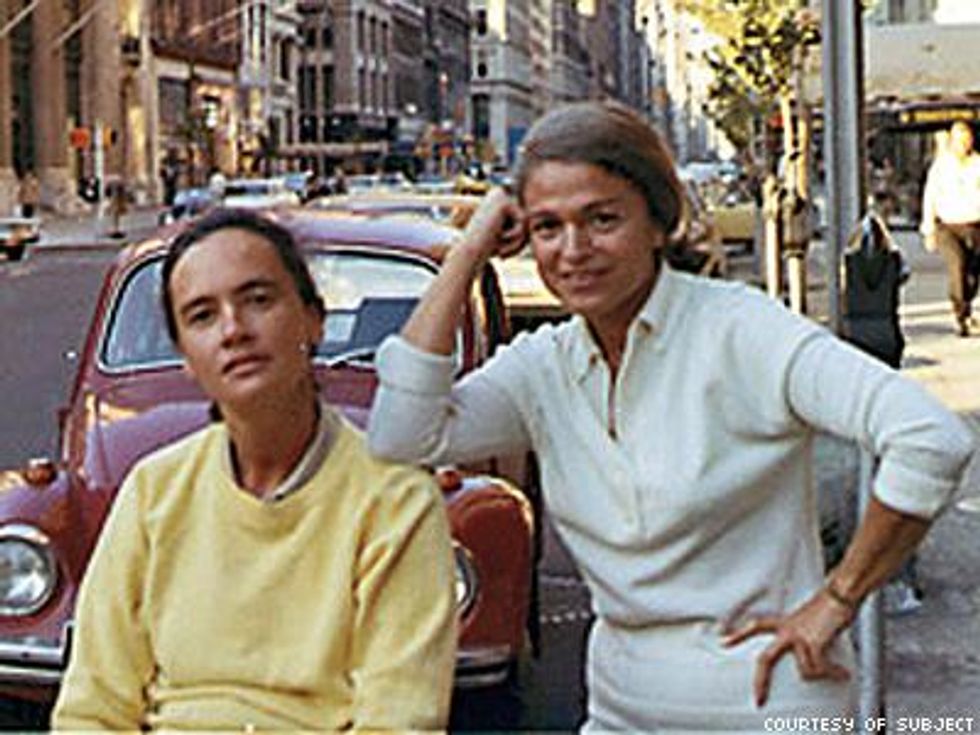
Edith Windsor, an octogenarian lesbian widow in New York, is going toe-to-toe with the House Republicans on the Defense of Marriage Act
September 10 2012 12:00 AM EST
May 26 2023 2:05 PM EST
By continuing to use our site, you agree to our Private Policy and Terms of Use.

Several challenges to the Defense of Marriage Act could reach the Supreme Court within the next year, but only one involves the estate tax that surviving same-sex spouses are forced to pay when a partner dies. The consequences can be severe, as Edith Windsor, the 83-year-old plaintiff in that case, learned after her wife, Thea Spyer, died in 2009.
A mathematician and former IBM programmer, Windsor calculated the financial impact of 1996's DOMA, which just added to the unquantifiable pain of losing her partner of more than 40 years. She paid over $363,000 in federal estate taxes on two properties the couple owned, in Manhattan and on Long Island, solely because the U.S. government did not recognize their marriage. The women married in Canada in 2007 after first becoming engaged in 1967, and Windsor cared for Spyer, a clinical psychologist, as she battled multiple sclerosis for three decades.
"However, if Thea had been Theo, I would have had to pay no estate tax whatsoever," she says. "Even if I had met and married 'Theo' one month before he died, I would have had to pay no estate tax."
That unequal treatment did not compute, and Windsor sued the government with help from the American Civil Liberties Union and the law firm Paul, Weiss, Rifkind, Wharton, and Garrison. She argued that DOMA violated her equal protection rights, and in June a federal judge in New York agreed and found section 3 of the law, which limits the federal definition of marriage to unions of a man and a woman, unconstitutional.
 Edie (right) and Thea in the '60s.
Edie (right) and Thea in the '60s.The House Republican-controlled Bipartisan Legal Advisory Group, which took up the defense of DOMA after the Obama administration declined to defend section 3 of the law, has appealed the decision to the U.S. Court of Appeals for the Second Circuit. Oral arguments are scheduled for September 27. Windsor has also petitioned the Supreme Court to hear her case, in part because of her advanced age and fragile health due to a heart condition.
Windsor sold bonds, a major source of her retirement income, to pay her tax bill, and she estimates that a significant portion of her finances will be depleted within four years. In addition to a refund and a Supreme Court ruling against DOMA, she wants her case to result in "a gradual lessening of ignorant bias."
"I think about teenagers falling in love for the first time and knowing that they could marry someday, feeling not excluded and denigrated by their government," she says. "I think about the children of same-sex couples no longer having to defend the legitimacy of their families. And I think about the beginning of the end of stigma and gay bashing, internalized homophobia and closets, and lying about who we are. I think about hope for our lives fully in the open in our country and society."
Known as "Edie," Windsor has volunteered for many LGBT organizations over the past 30 years, including service on the board of Services and Advocacy for GLBT Elders and overseeing the computers for swimming meets at the 1994 Gay Games. Her plight has captured hearts, with spectators at the New York City Pride March this year shouting her name and approaching to shake her hand.
Could this profile make Windsor the perfect foil for House Republicans who strongly oppose taxes? The courts will decide, but her legal team is hopeful.
"We believe that anyone can relate to what happened to Edie after Thea died," says her attorney Roberta A. Kaplan. "The injustice of losing one's spouse and then having to pay a large portion of your inheritance as a widow to the government as a tax is something that is painfully clear to every American."